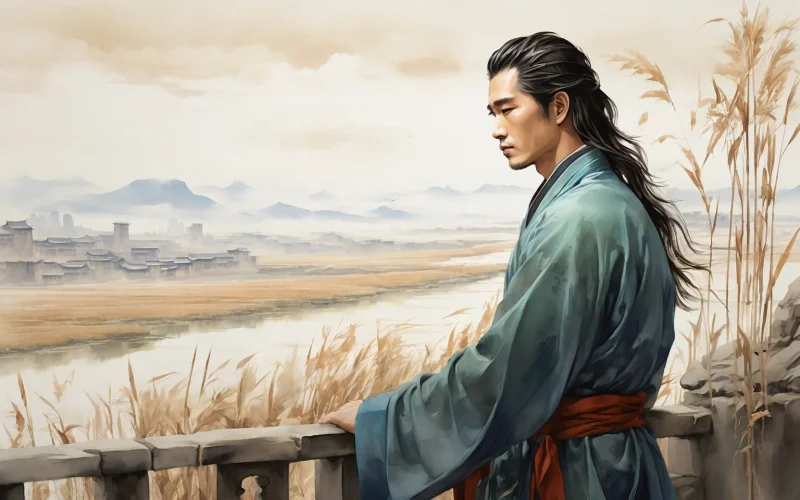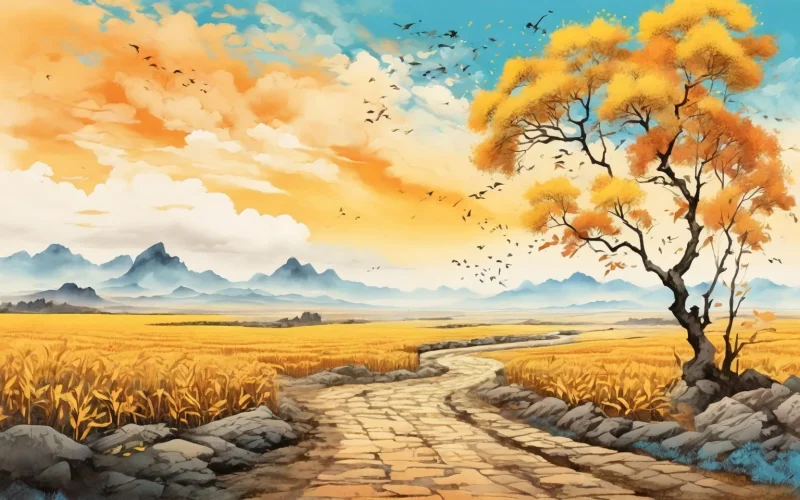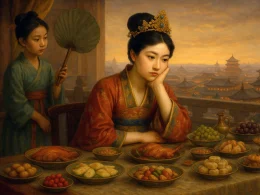Leaning on the battlement, I gaze afar,
A homesick sorrow rises dark and deep.
Frost lies white on reed flowers bare,
Hills fade in mist where night dews weep.
Wild geese descend on sandy bars,
War drums boom from Tartar posts—startling the air.
A lone tree stands in autumn’s scars;
I sing mad songs, my tears stain the tassels there.
Original Poem
「边城独望」
马戴
聊凭危堞望,暗起异乡情。
霜落蒹葭白,山昏雾露生。
河滩胡雁下,戎垒汉鼙惊。
独树残秋色,狂歌泪满缨。
Interpretation
This poem was composed during Ma Dai's military service at the frontier, around the late Tang period. Having served in the Datong army headquarters, the poet long dwelled in the borderlands, witnessing the harsh landscapes and hardships of military life. Filled with indignation and loneliness, he wrote this poem while standing alone atop a frontier wall, gazing at the desolate scenery with profound emotions. The verses blend scene and sentiment, with somber imagery that reveals the solitary yet intense spiritual world of a frontier soldier.
First Couplet: "聊凭危堞望,暗起异乡情。"
Liáo píng wēi dié wàng, àn qǐ yì xiāng qíng.
Leaning on the high wall, I gaze afar; Unbidden, homesickness rises like a scar.
The poet begins by positioning himself atop the frontier wall, establishing a vantage point for observation. The act of "leaning" suggests both physical weariness and emotional burden, while the sudden surge of homesickness reflects the involuntary nature of longing. This couplet introduces the dual themes of solitary watchfulness and exile's melancholy.
Second Couplet: "霜落蒹葭白,山昏雾露生。"
Shuāng luò jiān jiā bái, shān hūn wù lù shēng.
Frost bleaches reeds to bone-white hue; Mountains drown in mist, the dusk imbued.
These lines paint a frigid borderland panorama where frost transforms reeds into spectral figures and mountains disappear into creeping mist. The whitening reeds and darkening peaks create a monochromatic landscape of desolation, mirroring the soldier's inner emptiness as day gives way to night.
Third Couplet: "河滩胡雁下,戎垒汉鼙惊。"
Hé tān hú yàn xià, róng lěi hàn pí jīng.
On sandy flats, Tartar geese descend; From Han war-drums, the frontier shakes unkenned.
The scene shifts to dynamic frontier imagery: migratory birds symbolizing transience contrast with the sudden alarm of military drums. The "Tartar geese" represent nomadic forces while "Han drums" signify defensive preparations, creating tension between natural cycles and human conflict on the contested borderlands.
Fourth Couplet: "独树残秋色,狂歌泪满缨。"
Dú shù cán qiū sè, kuáng gē lèi mǎn yīng.
A lone tree clutches autumn's dying light; I sing madly—tears drench my cap's tight.
The final image crystallizes the poem's essence: a solitary tree becomes the last bastion of seasonal beauty, paralleling the soldier's emotional outburst. His "mad song" and tear-soaked official cap tassels manifest the unbearable tension between duty and despair at the empire's edge.
Holistic Appreciation
Gazing Alone at the Frontier is a frontier poem that masterfully blends scene and emotion, exuding a solemn and melancholic aura. With profound artistic expression, Ma Dai seamlessly intertwines the solitude of borderland life with the observed landscape and inner turmoil, crafting an introspective "solitary gaze" that unifies external and internal worlds. The poem’s four couplets progress methodically: beginning with an ascent to higher ground, then gazing into the distance at frost-bleached mountains and mist-shrouded reeds, before shifting to nearby sights—descending northern geese and the startling beat of war drums—and finally culminating in an emotional outburst: "Wild singing, tears soaking my cap-strings." This line encapsulates the poem’s intensity, leaving a lasting impression. The emotions evolve subtly from quiet melancholy to fierce passion, from silent contemplation to unrestrained lament, creating a powerful, dynamic rhythm that deeply moves the reader.
Artistic Merits
The poem’s structure is meticulously layered, advancing step by step with a compelling cadence. The opening couplet establishes mood, the second depicts distant scenery, the third intensifies the exoticism of the frontier with close-up details, and the final couplet circles back to raw emotion—each transition fluidly merging feeling with landscape. The imagery is vivid, the emotions potent, and the language concise yet profound. The poet excels at using nature to amplify sentiment, particularly through motifs like "northern geese" and "war drums," which evoke the frontier’s distinctive atmosphere, embodying the essence of frontier poetry.
Insights
Gazing Alone at the Frontier captures the isolation and melancholy of borderland existence, reflecting the broader human experience of displacement and emotional struggle. More than a personal lament, it conveys a universal sense of solitude that resonates across time. Reading it today, we still feel its emotional weight, offering profound insights into spiritual turmoil and identity. The poem reminds us that in times of uncertainty and exile, authentic emotional expression becomes a profound source of strength.
About the poet

Ma Dai (马戴) (c. 803 – 876), courtesy name Yuchen (虞臣), was a native of Quyang (present-day southwest of Donghai, Jiangsu) and a distinguished poet of the mid-Tang period. His poetry is characterized by its refreshing clarity and concise elegance, with particular mastery of five-character regulated verse (五律), embodying a unique aesthetic within Tang literary traditions.











